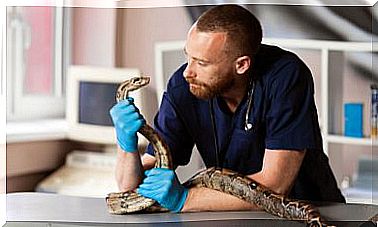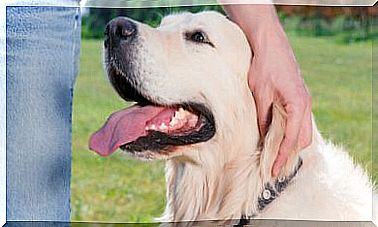Caries In Cats, Do You Know How To Diagnose Your Cat’s Oral Condition?
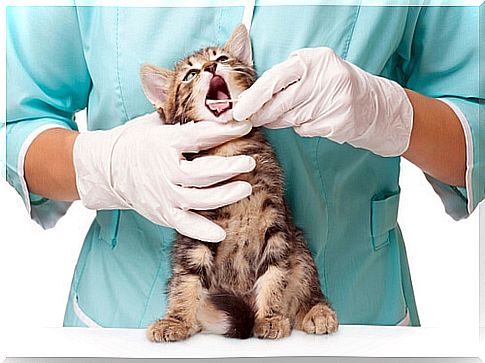
Cavities in cats, as people usually suffer, are a rare pathology. What cats often suffer from is the so-called odontoclastic reabsorptive lesion.
It is a deterioration of the structure of the tooth, in appearance similar to that of humans, but with a different mechanism. That is why it is also known by the name of false cavities.
Tooth decay in cats: a rare ailment
Although cavities in cats appear rarely, because their diet is not rich in sugars, veterinarians specialized in dentistry have observed an increase in cases in recent times.
The cause must be found in the bad habit of giving sweets to pets.
Outside of this specific data, other reasons that can cause cavities in kittens are poor nutrition and poor oral hygiene. Remember that this pathology is due to the presence of acids produced by plaque bacteria that is deposited on dental surfaces, causing tissue destruction or necrosis.
The molars of kittens are the most affected by this ailment. The treatment that must be applied to the appearance of cavities is similar to that carried out by our dentist, depending on the size of the cavities and the parts of the tooth that have affected.
Information on feline odontoclastic reabsorptive lesion
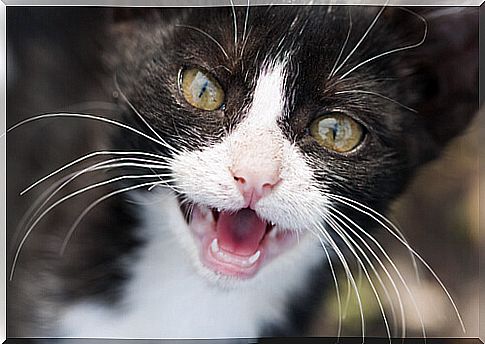
False tooth decay in cats occurs when cells – called odontoclasts – are activated, for reasons still unknown, and begin to destroy hard dental tissues. This problem generally begins in the cervical area of the tooth and progressively spreads to the root and crown.
This disease can affect 50 percent of kittens and is more common in older animals.
The most affected teeth are usually the lower third premolars, the lower molars and the upper fourth premolar.
Signs of false feline cavities
Signs that may indicate that your kitten is suffering from this condition include:
- Pain (the animal constantly touches its mouth with its paws)
- Swollen gums
- Excessive salivation
- Anorexy
- Loss of teeth
- Difficulty or inability to swallow
- Apathy
- Halitosis
- Constant sneezing
- Frequent tongue movements
- Yellowing teeth
- Slimming
- Lethargy
- Mouth bleeding
Diagnosis and treatment of odontoclastic reabsorptive lesion
Although the diagnosis of this lesion can be made by simply observing the mouth of cats, it is sometimes not easy to detect it. Is that as they usually appear in the neck area of the teeth, they can be covered by the gum, tartar or bacterial plaque.
For this reason, an accurate diagnosis must be given through x-rays.
Although it is feasible to use some restorative treatment of the teeth, it is most likely that it will not stop the progression of the disease, so the extraction of the affected teeth is recommended.
Possible causes of false cavities
Specialists have developed various hypotheses about the reasons for this pathology in felines, but none have been proven so far. Among them are:
- An immune-mediated reaction caused by an inflammatory condition.
- Acute or chronic mechanical stress from traumatic fractures.
- A diet weak in calcium or with excess vitamin D.
- Viral diseases such as leukemia and feline immunodeficiency (FIV), calicivirus (CVF), and herpesvirus (FHV-1).
- Acids generated as a consequence of bacterial fermentation associated with periodontal disease.
- Acid regurgitation of hairballs.
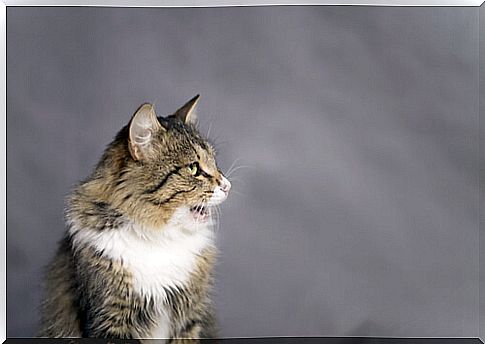
Cats with well-groomed teeth
Since resorptive odontoclastic lesions are progressive in nature, they are more likely to be under control if they are diagnosed early. This will prevent the destruction of dental tissue and the appearance of severe associated manifestations, such as anorexia due to oral pain.
In addition, if your kitten has suffered from false cavities, it is important that you regularly check his teeth with a specialist, since the animals that were affected by this ailment can repeat it at some point in their life.
So do not forget to consult the vet with any questions and, also, ask him to advise you on the best way to keep his mouth properly sanitized.







